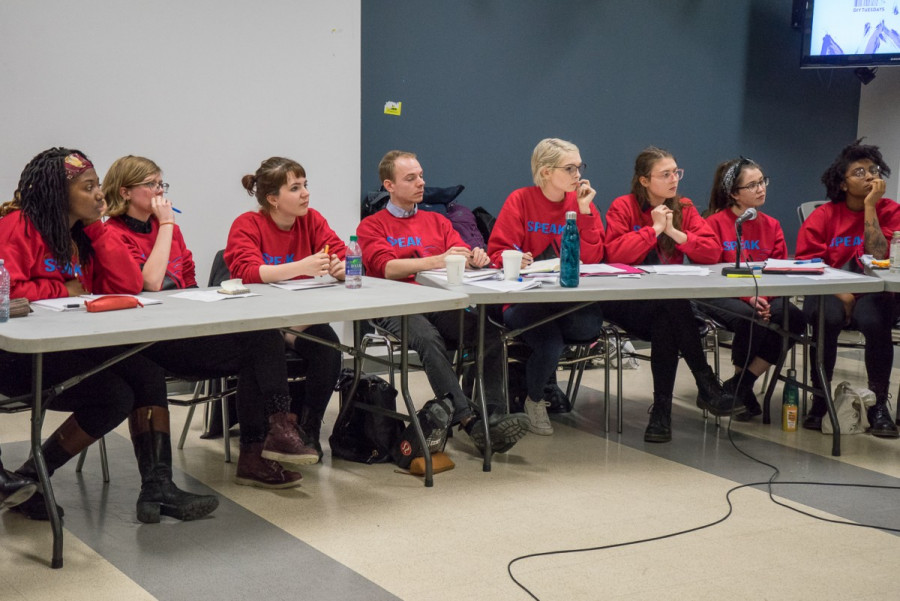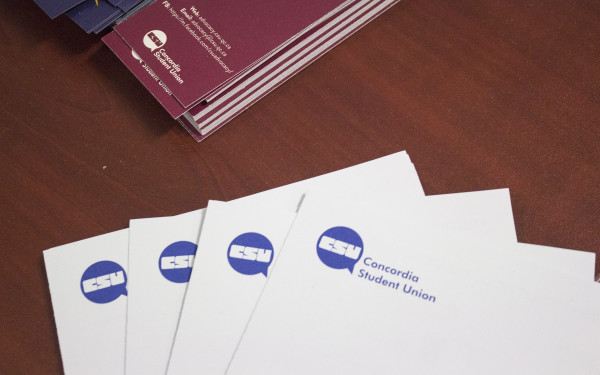CSU Judicial Board Overrules Speak Up Disqualification
Speak Up to Take Office, Ballots to be Recounted
A judicial board in the Concordia Student Union has unanimously overturned the disqualification of Speak Up, after Chief-Electoral Officer Nicholas Roberts disqualified the highest-ranking team on March 30.
Roberts had originally announced Accessibility, Community and Transparency the winning slate in his unofficial announcement of the results, to the shock of many students on campus, as Speak Up held significant margins over the two other competing slates.
The judicial board unanimously ruled that the Link editorial didn’t constitute any new correspondence between candidates and student media, and said there was a lack of evidence to suggest otherwise.
On Friday, members from The Link’s editorial team, Speak Up and witnesses met for a meeting with the judicial board as various spectators watched the open session in the Hall building.
Roberts disqualified Speak Up under CSU standing regulation Article 316, which states that, “Student media content regarding elections and election issues can be disseminated during the polling period, but no new correspondence between candidates or referendum committee members and student media can be published during the polling period.”
In an email previously obtained by The Link in late March, Roberts alleged Speak Up had correspondence with The Link during polling as an editorial had been published endorsing the slate the morning polling began. At the time, Roberts was not available for further comment.
While candidates are not allowed to campaign during polling period to ensure a fair election, exceptions are made for student journalists, who have a right to disseminate material related to the election during polling period according to CSU policy.
The judicial board also ruled The Link can publish editorial endorsements during the polling of CSU elections, as long as “no new correspondence between candidates or referendum committee members and student media […] be published [as well].”
Roberts is asked to recount the ballots, and to announce Speak Up as the unofficial winners of the race, meaning Speak Up will take on all executive positions for the Concordia Student Union executive team.
Friday’s Judicial Board Meeting
Roberts didn’t attend the judicial board meeting on Friday, but submitted a statement that was read out loud. The judicial board also accepted it as his evidence of correspondence between Speak Up and The Link.
“The disqualification is based on the fact that it was clear to me that Speak Up was aware that a major campus newspaper would be disseminating information on the first day of election, that strongly promoted their platform,” Roberts wrote. “It was clear to me that this was a fact that Speak Up could not be unaware of, and which they took no steps to avoid.”
In motivating for Speak Up, runner up for General Coordinator Sophie Hough said her team’s disqualification was uncalled for as their slate had no control over The Link’s editorial direction.
Hough said the slate didn’t solicit any endorsement, didn’t share the editorial on their social media platforms, didn’t receive any warning about the editorial being published, and stressed that no new correspondence or information was found in the editorial itself.
“Editorials by The Link are always released on Tuesdays, and in almost every election The Link releases an editorial that takes a side in one election issue or another,” said Hough. “Speak Up has no control over the editorial direction of The Link, or any control in the editorial content of The Link.”
Hough also reminded the judicial board that “neither circumstantial evidence nor imputed interest shall be sufficient to justify disqualification” under the CSU’s standing regulations.
Kelsey Litwin, who recently ended her mandate as editor-in-chief of The Link, spoke on The Link’s behalf and told the judicial board that Speak Up received no warning of the endorsement, and stressed no new reporting was disseminated through the editorial.
“It is customary in mainstream media as well as in The Link to publish editorials endorsements regarding CSU and occasionally faculty associations elections,” Litwin said, mentioning that The Link has done so since 1984, often publishing on first day of polling as the dates tend to align.
Former CSU General Coordinator Lucinda Marshall-Kiparissis helped to write the section of the standing regulation Roberts cited to disqualify Speak Up when she was on the CSU’s policy committee in 2015. On Friday, Marshall-Kiparissis gave a statement as a witness to explain how the policy was meant to be interpreted.
“It was just an assumption then that of course the student media can publish during polling period, it’s happened every year,” she explained. “We deliberately put [Article 316] in to ensure that there wasn’t any ambiguity […] just to make sure that the CEO and students would know that even during polling period, the independent press can talk about the elections.”
She added that the section of standing regulations stating no new correspondence could be published during polling was added so that competing candidates couldn’t come up with and publish new campaign promises during polling time.
“To be honest I’m a bit baffled,” she said. “It’s unprecedented.”
With files from Alexander Perez.



_600_375_90_s_c1.jpg)

